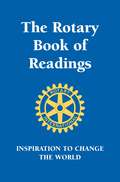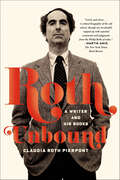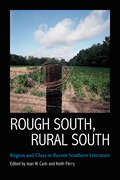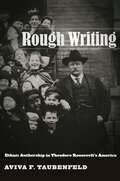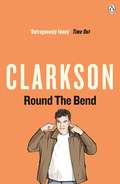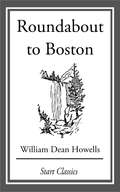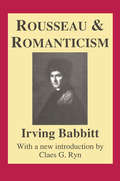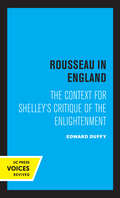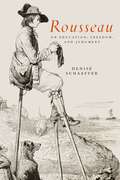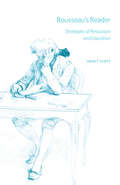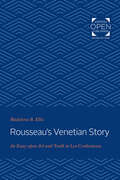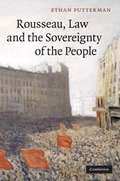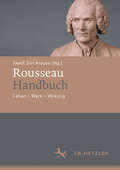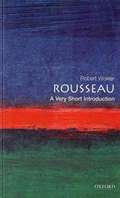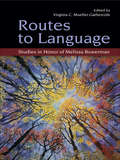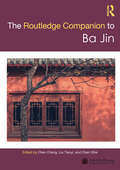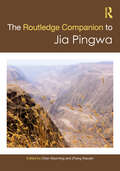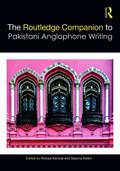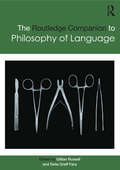- Table View
- List View
Rotary Book of Readings: Inspiration to Change the World (Little Book. Big Idea.)
by Hobart Rotary ClubThe Rotary Book of Readings collects over 175 quotations exploring the goals and values of this preeminent humanitarian organization. In its pages you will discover the core principles embodied by Rotary International, including volunteerism, leadership, community, and peace, all through these inspirational quotes—many from noted members of Rotary International. The Rotary Book of Readings is an excellent resource for Rotarians to help inspire their weekly meetings, to instill Rotarian values in new members, to use a gift for guest speakers, for local RYLA, Rotary student exchange and other youth programs, as a membership recruitment aid, and much more. Developed by the members of the Rotary Club of Hobart, New York, sales of The Rotary Book of Readings help support projects throughout the world.Since its founding in 1905, Rotary International has been one of the leading humanitarian and volunteer outreach organizations in the United States. Over 1 million members strong, their commitment to the ideals of human rights and improving life for everyone has had an enormous impact, touching the lives of countless people. And through it all, Rotary International has followed the direction of their guiding principles, core values that have served as the cornerstone of Rotary International’s global mission. The primary goal of Rotary International is to bring together like-minded people to provide humanitarian services and help build goodwill and peace in the world. Explore their mission like never before in The Rotary Book of Readings, and help to make the world a better place—one step at a time.
Roth Unbound: A Writer and His Books
by Claudia Roth PierpontA critical evaluation of Philip Roth—the first of its kind—that takes on the man, the myth, and the workPhilip Roth is one of the most renowned writers of our time. From his debut, Goodbye, Columbus, which won the National Book Award in 1960, and the explosion of Portnoy's Complaint in 1969 to his haunting reimagining of Anne Frank's story in The Ghost Writer ten years later and the series of masterworks starting in the mid-eighties—The Counterlife, Patrimony, Operation Shylock, Sabbath's Theater, American Pastoral, The HumanStain—Roth has produced some of the great American literature of the modern era. And yet there has been no major critical work about him until now. Here, at last, is the story of Roth's creative life. Roth Unbound is not a biography—though it contains a wealth of previously undisclosed biographical details and unpublished material—but something ultimately more rewarding: the exploration of a great writer through his art. Claudia Roth Pierpont, a staff writer for The New Yorker, has known Roth for nearly a decade. Her carefully researched and gracefully written account is filled with remarks from Roth himself, drawn from their ongoing conversations. Here are insights and anecdotes that will change the way many readers perceive this most controversial and galvanizing writer: a young and unhappily married Roth struggling to write; a wildly successful Roth, after the uproar over Portnoy, working to help writers from Eastern Europe and to get their books known in the West; Roth responding to the early, Jewish—and the later, feminist—attacks on his work. Here are Roth's family, his inspirations, his critics, the full range of his fiction, and his friendships with such figures as Saul Bellow and John Updike. Here is Roth at work and at play.Roth Unbound is a major achievement—a highly readable story that helps us make sense of one of the most vital literary careers of the twentieth and twenty-first centuries.
Rough South, Rural South: Region and Class in Recent Southern Literature
by Jean W. Cash and Keith PerryEssays in Rough South, Rural South describe and discuss the work of southern writers who began their careers in the late twentieth and early twenty-first centuries. They fall into two categories. Some, born into the working class, strove to become writers and learned without benefit of higher education, such writers as Larry Brown and William Gay. Others came from lower- or middle-class backgrounds and became writers through practice and education: Dorothy Allison, Tom Franklin, Tim Gautreaux, Clyde Edgerton, Kaye Gibbons, Silas House, Jill McCorkle, Chris Offutt, Ron Rash, Lee Smith, Brad Watson, Daniel Woodrell, and Steve Yarbrough. Their twenty-first-century colleagues are Wiley Cash, Peter Farris, Skip Horack, Michael Farris Smith, Barb Johnson, and Jesmyn Ward. In his seminal article, Erik Bledsoe distinguishes Rough South writers from such writers as William Faulkner and Erskine Caldwell. Younger writers who followed Harry Crews were born into and write about the Rough South. These writers undercut stereotypes, forcing readers to see the working poor differently. The next pieces begin with those on Crews and Cormac McCarthy, major influences on an entire generation. Later essays address members of both groups—the self-educated and the college-educated. Both groups share a clear understanding of the value of working-class southerners. Nearly all of the writers hold a reverence for the South's landscape and its inhabitants as well as an affinity for realistic depictions of setting and characters.
Rough Writing: Ethnic Authorship in Theodore Roosevelt’s America (Nation of Nations #6)
by Aviva F. TaubenfeldAs the United States struggled to absorb a massive influx of ethnically diverse immigrants at the turn of the twentieth century, the question of who and what an American is took on urgent intensity. It seemed more critical than ever to establish a definition by which Americanness could be established, transmitted, maintained, and judged. Americans of all stripes sought to articulate and enforce their visions of the nation’s past, present, and future; central to these attempts was President Theodore Roosevelt.Roosevelt fully recognized the narrative component of American identity, and he called upon authors of diverse European backgrounds including Israel Zangwill, Jacob Riis, Elizabeth Stern, and Finley Peter Dunne to promote the nation in popular written form. With the swell and shift in immigration, he realized that a more encompassing national literature was needed to “express and guide the soul of the nation.” Rough Writing examines the surprising place and implications of the immigrant and of ethnic writing in Roosevelt’s America and American literature.
Round the Bend
by Jeremy ClarksonJeremy Clarkson gets REALLY riled up in Round the BendWhat's it like to drive a car that's actively trying to kill you?This and many other burning questions trouble Jeremy Clarkson as he sets out to explore the world from the safety of four wheels. Avoiding the legions of power-crazed traffic wombles attempting to block highway and byway, he he:- Shows how the world of performance cars may be likened to Battersea Dogs Home- Reveals why St Moritz may be the most bonkers town in all of the world- Reminds us that Switzerland is so afraid of snow that any flakes falling on the road are immediately arrested- Argues that washing a car is a waste of timeFunny, globe-trotting, irreverent and sometimes downright rude, Round the Bend is packed with curious and fascinating but otherwise hopelessly useless stories and facts about everything under the sun (and just occasionally cars). It's Jeremy Clarkson at his brilliant best.Praise for Jeremy Clarkson'Brilliant . . . laugh-out-loud' Daily Telegraph'Outrageously funny . . . will have you in stitches' Time Out'Very funny . . . I cracked up laughing on the tube' Evening Standard
Roundabout to Boston
by William Dean HowellsWilliam Dean Howells (1837-1920) was an American realist author and literary critic. He wrote his first novel, Their Wedding Journey, in 1871, but his literary reputation really took off with the realist novel A Modern Instance, published in 1882, which describes the decay of a marriage. His 1885 novel The Rise of Silas Lapham is perhaps his best known, describing the rise and fall of an American entrepreneur in the paint business. His social views were also strongly reflected in the novels Annie Kilburn (1888) and A Hazard of New Fortunes (1890). While known primarily as a novelist, his short story "Editha" (1905) - included in the collection Between the Dark and the Daylight (1907) - appears in many anthologies of American literature. Howells also wrote plays, criticism, and essays about contemporary literary figures such as Ibsen, Zola, Verga, and, especially, Tolstoy, which helped establish their reputations in the United States. He also wrote critically in support of many American writers. It is perhaps in this role that he had his greatest influence.
Rousseau and German Idealism
by David JamesThe claim that Rousseau's writings influenced the development of Kant's Critical philosophy, and German Idealism, is not a new one. As correct as the claim may be, it does not amount to a systematic account of Rousseau's place within this philosophical tradition. It also suggests a progression whereby Rousseau's achievements are eventually eclipsed by those of Kant, Fichte and Hegel, especially with respect to the idea of freedom. In this book David James shows that Rousseau presents certain challenges that Kant and the idealists Fichte and Hegel could not fully meet, by making dependence and necessity, as well as freedom, his central concerns, and thereby raises the question of whether freedom in all its forms is genuinely possible in a condition of human interdependence marked by material inequality. His study will be valuable for all those studying Kant, German idealism, and the history of eighteenth- and nineteenth-century ideas.
Rousseau and Romanticism (Bcl Ser. #No. Ii)
by Otto ScottThis volume is the best-known and most widely discussed work of the influential scholar and critic Irving Babbitt (1865-1933), intellectual leader of the movement known as the New Humanism. It is also the work that best conveys the ethical and aesthetic core of his thought. Broad in scope, it examines a variety of manifestations of romanticism and presents a typology of the imaginative inclinations of that movement Rousseau is analyzed as paradigmatic of the ethical and aesthetic sensibility that is replacing the classical and Christian outlook in the Western world. For Babbitt, works of imagination are integral to human life in general. He explores romanticism with a view to its implications for Western civilization.Babbitt identifies serious ethical, religious, aesthetic, and philosophical problems in the modern world, but he also shows how remedies to those problems must incorporate the best insights of modernity. First published in 1919, the book is strikingly relevant to today's discussion of the crisis of American and Western culture and education. Babbitt anticipated and analyzed dangerous cultural trends whose consequences are now widely bemoaned. He applies to these phenomena an intellectual breadth and depth rare today. At the end of the twentieth century his prescriptions for dealing with the central problems of Western civilization have acquired an acute urgency. At a time of much renewed interest in Rousseau, Babbitt's book offers a penetrating commentary that challenges widely held beliefs and interpretations.Graced with a lengthy and wide-ranging new introduction by Claes G. Ryn, Rousseau and Romanticism is simultaneously a work of literary history, criticism, and a theory of civilization. In addressing its special subject, this classic study reflects the main themes of Babbitt's thought, making it representative of his work as a whole. Ryn explicates and critically assesses Babbitt's central ideas, refutes widely circulating
Rousseau in Drag
by Rosanne Terese KennedyThrough a series of close readings of most of Rousseau's major writings, this book provides a new interpretation of the eighteenth-century philosopher's sexual politics. The text argues that Rousseau's writings provide a critique of not only normative gender identity, but also normative familial and kinship relations.
Rousseau in England: The Context for Shelley's Critique of the Enlightenment
by Edward DuffyThis title is part of UC Press's Voices Revived program, which commemorates University of California Press’s mission to seek out and cultivate the brightest minds and give them voice, reach, and impact. Drawing on a backlist dating to 1893, Voices Revived makes high-quality, peer-reviewed scholarship accessible once again using print-on-demand technology. This title was originally published in 1979.
Rousseau on Education, Freedom, and Judgment
by Denise SchaefferIn Rousseau on Education, Freedom, and Judgment, Denise Schaeffer challenges the common view of Rousseau as primarily concerned with conditioning citizens’ passions in order to promote republican virtue and unreflective patriotism. Schaeffer argues that, to the contrary, Rousseau’s central concern is the problem of judgment and how to foster it on both the individual and political level in order to create the conditions for genuine self-rule. Offering a detailed commentary on Rousseau’s major work on education, Emile, and a wide-ranging analysis of the relationship between Emile and several of Rousseau’s other works, Schaeffer explores Rousseau’s understanding of what good judgment is, how it is learned, and why it is central to the achievement and preservation of human freedom. The model of Rousseauian citizenship that emerges from Schaeffer’s analysis is more dynamic and self-critical than is often recognized. This book demonstrates the importance of Rousseau’s contribution to our understanding of the faculty of judgment, and, more broadly, invites a critical reevaluation of Rousseau’s understanding of education, citizenship, and both individual and collective freedom.
Rousseau on Education, Freedom, and Judgment
by Denise SchaefferIn Rousseau on Education, Freedom, and Judgment, Denise Schaeffer challenges the common view of Rousseau as primarily concerned with conditioning citizens’ passions in order to promote republican virtue and unreflective patriotism. Schaeffer argues that, to the contrary, Rousseau’s central concern is the problem of judgment and how to foster it on both the individual and political level in order to create the conditions for genuine self-rule. Offering a detailed commentary on Rousseau’s major work on education, Emile, and a wide-ranging analysis of the relationship between Emile and several of Rousseau’s other works, Schaeffer explores Rousseau’s understanding of what good judgment is, how it is learned, and why it is central to the achievement and preservation of human freedom. The model of Rousseauian citizenship that emerges from Schaeffer’s analysis is more dynamic and self-critical than is often recognized. This book demonstrates the importance of Rousseau’s contribution to our understanding of the faculty of judgment, and, more broadly, invites a critical reevaluation of Rousseau’s understanding of education, citizenship, and both individual and collective freedom.
Rousseau's Critique of Inequality
by Frederick NeuhouserRousseau's Discourse on the Origin of Inequality among Mankind, published in 1755, is a vastly influential study of the foundations of human society, including the economic inequalities it tends to create. To date, however, there has been little philosophical analysis of the Discourse in the literature. In this book, Frederick Neuhouser offers a rich and incisive philosophical examination of the work. He clarifies Rousseau's arguments as to why social inequalities are so prevalent in human society and why they pose fundamental dangers to human well-being, including unhappiness, loss of freedom, immorality, conflict, and alienation. He also reconstructs Rousseau's four criteria for assessing when inequalities are or are not legitimate, and why. His reconstruction and evaluation of Rousseau's arguments are accessible to both scholars and students, and will be of interest to a broad range of readers including philosophers, political theorists, cultural historians, sociologists, and economists.
Rousseau's Reader: Strategies of Persuasion and Education
by John T. ScottOn his famous walk to Vincennes to visit the imprisoned Diderot, Rousseau had what he called an “illumination”—the realization that man was naturally good but becomes corrupted by the influence of society—a fundamental change in Rousseau’s perspective that would animate all of his subsequent works. At that moment, Rousseau “saw” something he had hitherto not seen, and he made it his mission to help his readers share that vision through an array of rhetorical and literary techniques. In Rousseau’s Reader, John T. Scott looks at the different strategies Rousseau used to engage and persuade the readers of his major philosophical works, including the Social Contract, Discourse on Inequality, and Emile. Considering choice of genre; textual structure; frontispieces and illustrations; shifting authorial and narrative voice; addresses to readers that alternately invite and challenge; apostrophe, metaphor, and other literary devices; and, of course, paradox, Scott explores how the form of Rousseau’s writing relates to the content of his thought and vice versa. Through this skillful interplay of form and content, Rousseau engages in a profoundly transformative dialogue with his readers. While most political philosophers have focused, understandably, on Rousseau’s ideas, Scott shows convincingly that the way he conveyed them is also of vital importance, especially given Rousseau’s enduring interest in education. Giving readers the key to Rousseau’s style, Scott offers fresh and original insights into the relationship between the substance of his thought and his literary and rhetorical techniques, which enhance our understanding of Rousseau’s project and the audiences he intended to reach.
Rousseau's Reader: Strategies of Persuasion and Education
by John T. ScottOn his famous walk to Vincennes to visit the imprisoned Diderot, Rousseau had what he called an “illumination”—the realization that man was naturally good but becomes corrupted by the influence of society—a fundamental change in Rousseau’s perspective that would animate all of his subsequent works. At that moment, Rousseau “saw” something he had hitherto not seen, and he made it his mission to help his readers share that vision through an array of rhetorical and literary techniques. In Rousseau’s Reader, John T. Scott looks at the different strategies Rousseau used to engage and persuade the readers of his major philosophical works, including the Social Contract, Discourse on Inequality, and Emile. Considering choice of genre; textual structure; frontispieces and illustrations; shifting authorial and narrative voice; addresses to readers that alternately invite and challenge; apostrophe, metaphor, and other literary devices; and, of course, paradox, Scott explores how the form of Rousseau’s writing relates to the content of his thought and vice versa. Through this skillful interplay of form and content, Rousseau engages in a profoundly transformative dialogue with his readers. While most political philosophers have focused, understandably, on Rousseau’s ideas, Scott shows convincingly that the way he conveyed them is also of vital importance, especially given Rousseau’s enduring interest in education. Giving readers the key to Rousseau’s style, Scott offers fresh and original insights into the relationship between the substance of his thought and his literary and rhetorical techniques, which enhance our understanding of Rousseau’s project and the audiences he intended to reach.
Rousseau's Social Contract
by David Lay WilliamsIf the greatness of a philosophical work can be measured by the volume and vehemence of the public response, there is little question that Rousseau's Social Contract stands out as a masterpiece. Within a week of its publication in 1762 it was banished from France. Soon thereafter, Rousseau fled to Geneva, where he saw the book burned in public. At the same time, many of his contemporaries, such as Kant, considered Rousseau to be 'the Newton of the moral world', as he was the first philosopher to draw attention to the basic dignity of human nature. The Social Contract has never ceased to be read and debated in the 250 years since its publication. Rousseau's Social Contract: An Introduction offers a thorough and systematic tour of this notoriously paradoxical and challenging text. David Lay Williams offers readers a chapter-by-chapter reading of the Social Contract, squarely confronting these interpretive obstacles. The book also features a special extended appendix dedicated to outlining Rousseau's famous conception of the general will, which has been the object of controversy since the Social Contract's publication in 1762.
Rousseau's Venetian Story: An Essay upon Art and Truth in Les Confessions
by Madeleine B. EllisOriginally published in 1966. This book is primarily a literary study of Rousseau's account of his diplomatic experiences in Venice, contained in book 7 of the Confessions and written in 1769. The author analyzes Rousseau's methods of achieving an artistic rendering of psychological truth in autobiography, as exemplified in his treatment of the events of 1742–1749. Professor Madeleine Ellis contributes to an understanding of Rousseau as a creative artist and positions him vis-à-vis the classical and romantic movements. Ellis collates the text of the Confessions with contemporary correspondence and other documents to show how discrepancies between the two have artistic implications. These implications lead her to define Rousseau's principles and methods as a man of letters and the interrelations of art and truth in his memoirs. In revealing that Rousseau, the memorialist, gives an artistic rendering of psychological truth, Ellis shows Rousseau's attitude toward truth. She does this by following a path of analysis unexplored by previous critics but indicated by Rousseau himself when he says, "It is the story of my soul that I have promised... I record not so much the events of my life as the state of my soul as they happened." Ultimately, the objective of this study is to illustrate the artistic means—literary and rhetorical—employed by Rousseau and their implications for the truth he proposed.
Rousseau, Law and the Sovereignty of the People
by Ethan PuttermanTogether with Plato's Republic, Jean-Jacques Rousseau's Social Contract is regarded as one of the most original examples of utopian political engineering in the history of ideas. Similar to the Republic, Rousseau's masterwork is better known today for its author's idiosyncratic view of political justice than its lessons on lawmaking or governance in any concrete sense. Challenging this common view, Rousseau, Law and the Sovereignty of the People examines the Genevan's contributions as a legislator and builder of institutions, relating his major ideas to issues and debates in twenty-first century political science. Ethan Putterman explores how Rousseau's just state would actually operate, investigating how laws would be drafted, ratified and executed, arguing that the theory of the Social Contract is more pragmatic and populist than many scholars assume today.
Rousseau-Handbuch: Leben – Werk – Wirkung
by Skadi Siiri KrauseJean-Jacques Rousseau (1712–1778) ist zweifellos einer der bedeutendsten und vielseitigsten Theoretiker der Aufklärung. Die Wirkung seines politischen, soziologischen, moralphilosophischen, pädagogischen, linguistischen, botanischen und kompositorischen Werks erstreckte sich im 18. Jahrhundert über ganz Europa und Nordamerika. Und diese Rezeption, die längst nicht mehr an bestimmte Länder gebunden ist, hält bis heute an. Dabei zeigt sich, dass Rousseaus Denken noch immer nicht in seiner ganzen Breite erschlossen ist. Gerade in der politischen Theorie ist häufig eine Verengung auf wenige, immer wieder interpretierte Texte und Textpassagen zu beobachten. Dem will das Handbuch entgegenwirken, indem es nicht nur die Fülle von Rousseaus Werk und seine vielfältigen Bezüge vorstellt, sondern auch neuere Forschungstendenzen skizziert, unterschiedliche Deutungsmuster präsentiert und Fragen nach Kohärenz und Widersprüchen, aber auch nach der Aktualität der Schriften des Denkers aufwirft.
Rousseau: A Very Short Introduction
by Robert WoklerOne of the most profound thinkers of modern history, Jean-Jacques Rousseau (1712-78) was a central figure of the European Enlightenment. He was also its most formidable critic, condemning the political, economic, theological, and sexual trappings of civilization along lines that would excite the enthusiasm of romantic individualists and radical revolutionaries alike. In this study of Rousseau's life and works Robert Wokler shows how his philosophy of history, his theories of music and politics, his fiction, educational and religious writings, and even his botany, were all inspired by visionary ideals of mankind's self-realization in a condition of unfettered freedom. He explains how, in regressing to classical republicanism, ancient mythology, direct communion with God, and solitude, Rousseau anticipated some post-modernist rejections of the Enlightenment as well.
Routes to Language: Studies in Honor of Melissa Bowerman
by Virginia C. Mueller GathercoleThis volume contains contributions from leaders in the field of child language in honor of one of the preeminent scholars in the field of child language acquisition, Melissa Bowerman. Melissa Bowerman has had a profound, widespread, and enduring influence on research conducted in the field for nearly 40 years. In addition to being a tribute to Professor Bowerman and her work, the chapters provide the most up-to-date statement of key positions by several leaders in the field of child language development. Fundamental questions in the field are explored in depth, and there are rich analyses of progress in the field in a number of areas, including learning words; crosslinguistic patterning and acquisition of lexical semantics; crosslinguistic patterning and events, paths, and causes; and influences on development. The volume is essential reading for researchers in child language and development, linguistics, psychology, education, and speech pathology, as well as researchers and practitioners specializing in the many specific languages discussed in the book.
Routledge Companion to Ba Jin (Chinese Literature Series from a Global Perspective)
by Chen Chang, Liu Tianyi, and Chen SiheExploring the creations of Ba Jin (1904–2005), one of the most significant writers in modern China, this edited volume offers in-depth discussions of the writer and his works from a global perspective to initiate and advance dialogues between the Chinese- and English- speaking scholarly communities. The four sections of the book provide readers with a detailed biography and an overview of research on Ba Jin since the 1980s to reflect on the academic achievements of several generations in China. In addition, it includes a selected collection of articles from Korean, German, and French scholars. These articles cover Ba Jin’s life thoughts, personality, literary creation, editing, publishing, and other aspects of the research. This companion aims to provide an alternative lens for Chinese literature studies in a global context. It will be an essential read to students and scholars of East Asian studies, Chinese studies, and those interested in modern Chinese literature.
Routledge Companion to Jia Pingwa (Chinese Literature Series from a Global Perspective)
by Chen Xiaoming and Zhang XiaoqinThis edited volume brings together global perspectives on the works of Jia Pingwa (1952–), one of the most important writers of contemporary China. It aims to promote dialogue on contemporary Chinese literature between the Chinese- and English-speaking academic communities.By examining Jia Pingwa’s work and related research from a global perspective, this collection offers in-depth analyses of his individual texts and a comprehensive review of his creative journey. The book covers research overview, studies within China, and international influence. The contents span from biographical information to detailed analyses of his various works, examining his literary style, themes, and cultural impact. It presents a concentrated view of Jia Pingwa studies since the New Era and provides a framework for situating, reflecting upon, and understanding the development of contemporary Chinese literature in a global context.The Companion will be essential reading for students and scholars of Chinese studies and contemporary Chinese literature, as well as readers interested in Jia Pingwa’s work.
Routledge Companion to Pakistani Anglophone Writing (Routledge Literature Companions)
by Aroosa Kanwal Saiyma AslamThe Routledge Companion to Pakistani Anglophone Writing forms a theoretical, comprehensive, and critically astute overview of the history and future of Pakistani literature in English. Dealing with key issues for global society today, from terrorism, religious extremism, fundamentalism, corruption, and intolerance, to matters of love, hate, loss, belongingness, and identity conflicts, this Companion brings together over thirty essays by leading and emerging scholars, and presents: the transformations and continuities in Pakistani anglophone writing since its inauguration in 1947 to today; contestations and controversies that have not only informed creative writing but also subverted certain stereotypes in favour of a dynamic representation of Pakistani Muslim experiences; a case for a Pakistani canon through a critical perspective on how different writers and their works have, at different times, both consciously and unconsciously, helped to realise and extend a uniquely Pakistani idiom. Providing a comprehensive yet manageable introduction to cross-cultural relations and to historical, regional, local, and global contexts that are essential to reading Pakistani anglophone literature, The Routledge Companion to Pakistani Anglophone Writing is key reading for researchers and academics in Pakistani anglophone literature, history, and culture. It is also relevant to other disciplines such as terror studies, post-9/11 literature, gender studies, postcolonial studies, feminist studies, human rights, diaspora studies, space and mobility studies, religion, and contemporary South Asian literatures and cultures.
Routledge Companion to Philosophy of Language (Routledge Philosophy Companions)
by Gillian Russell Delia Graff FaraPhilosophy of language is the branch of philosophy that examines the nature of meaning, the relationship of language to reality, and the ways in which we use, learn, and understand language. The Routledge Companion to Philosophy of Language provides a comprehensive and up-to-date survey of the field, charting its key ideas and movements, and addressing contemporary research and enduring questions in the philosophy of language. Unique to this Companion is clear coverage of research from the related disciplines of formal logic and linguistics, and discussion of the applications in metaphysics, epistemology, ethics and philosophy of mind. Organized thematically, the Companion is divided into seven sections: Core Topics; Foundations of Semantics; Parts of Speech; Methodology; Logic for Philosophers of Language; Philosophy of Language for the Rest of Philosophy; and Historical Perspectives. Comprised of 70 never-before-published essays from leading scholars--including Sally Haslanger, Jeffrey King, Sally McConnell-Ginet, Rae Langton, Kit Fine, John MacFarlane, Jeff Pelletier, Scott Soames, Jason Stanley, Stephen Stich and Zoltan Gendler Szabo--the Routledge Companion to Philosophy of Language promises to be the most comprehensive and authoritative resource for students and scholars alike.
